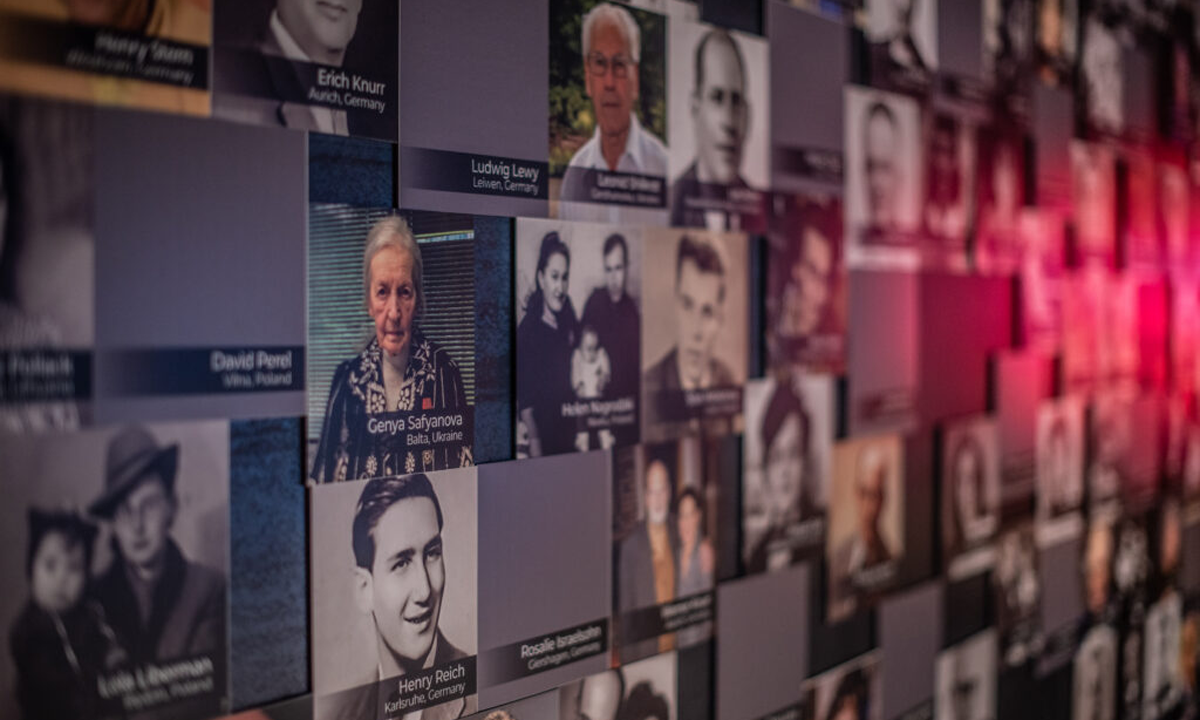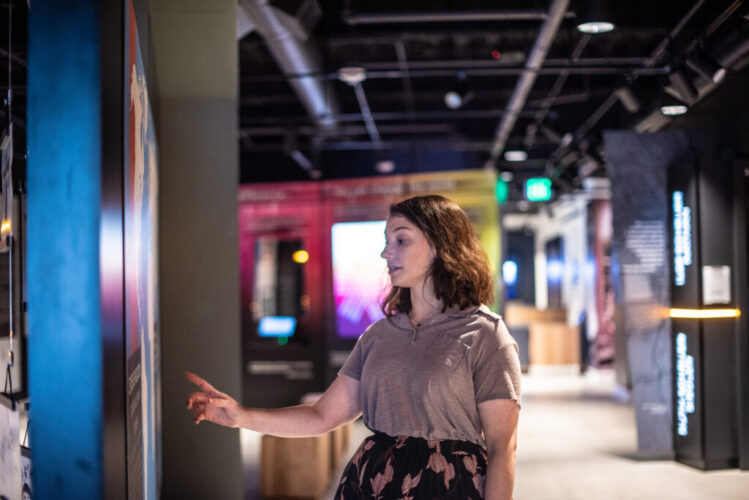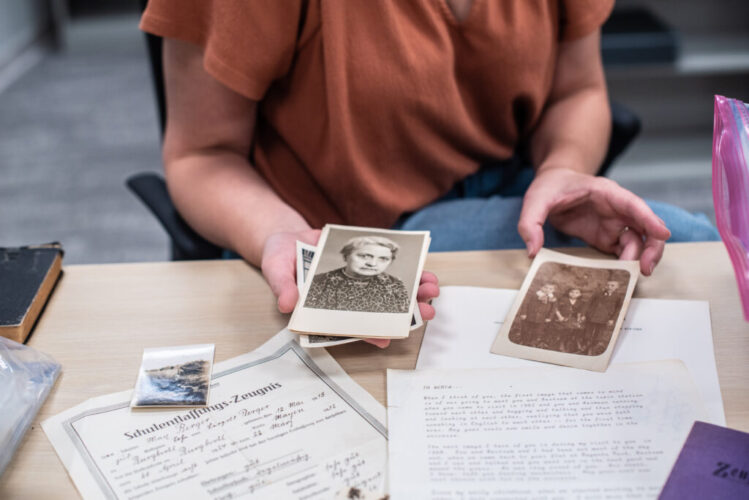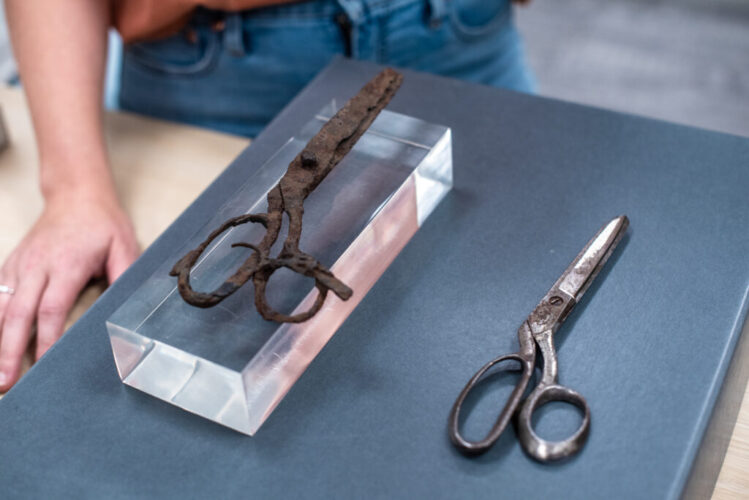‘The Keepers of This Story’: How the Holocaust Education Center Is Aiding Teachers
The Holocaust Education Center is in Birmingham, Alabama, where teaching of the Holocaust is not mandated

Get stories like this delivered straight to your inbox. Sign up for The 74 Newsletter
Logan Greene, a teacher in Hoover City Schools had his students read Four Perfect Pebbles, a memoir of a Holocaust survivor. He heard there was an opportunity for the author to come speak to students. But it would require them to raise $1,000 in around two weeks.
“I told the kids there’s no way we can do it,” he said.
But his students reacted enthusiastically. Five of them stood outside of basketball games for two weeks and raised over $2,000.
Greene said that effort by his students showed him the interest in the subject, and the power it has. He started looking for ways to “grow my own practice.”
“That showed me kind of the power of Holocaust education in schools and that led me to start researching how could I grow my own practice,” he said. “How could I get better? And I discovered the Birmingham Holocaust Education Center and started doing workshops and attending the teacher cadres and then it all snowballed from there.”
Alabama, like most states, does not mandate the teaching of the Holocaust. The state’s social studies standards, due to be revised in the next few years, could potentially include a Holocaust component in the future.
But even without a mandate, there is enormous interest from schools in the subject. The Holocaust Education Center, which recently established a home in Birmingham’s Temple Emanu-El, instructs teachers on how to teach the Holocaust to students in pedagogically sound ways. Gov. Kay Ivey went to the dedication ceremony on May 22.
“I think students want to learn about every hard history, because they like controversies and because I think that they want to make the world a better place,” said Zoe Weil, director of educator engagement at the Holocaust Education Center.
‘Sometimes there’s just not an answer’

Dan Puckett, chair of the Alabama Holocaust Commission, said that learning about the Holocaust is essential for students.
“I think it gives us a much better understanding of who we are,” he said. “Human rights, you know, understanding the value of human rights, the value of civic engagement, I mean, all of that’s necessary for a civil society. Everything that happened in the Holocaust, that we’re looking at, was actually a result of state-sponsored actions and none of it was illegal. It was sponsored by the German government, the Nazi government.”
Ann Mollengarden, an applied researcher at the center, said they do not prescribe a specific curriculum for teachers on the Holocaust, but they do make pedagogical recommendations. Some teachers may only have two or three days to address the subject.
One of the things the center emphasizes is that there are no simple answers when it comes to the Holocaust.
Mollengarden said teachers need to explain the history and discuss motivations. Every group, she said, had their own reasons for making the decisions they did.
Teachers should be prepared to be unable to answer the students’ questions, she said.
“A teacher always wants to be able to give an answer to a student and sometimes there’s just not an answer,” she said.
The center also recommends teaching history from different perspectives: perpetrators, victims and bystanders.
“This is not just A-to-B-to-C-to-D history,” she said.
Gretchen Skidmore, director of education initiatives at the United States Holocaust Museum, said that the Holocaust became more of a part of public school education in the 1970s, when more survivors began speaking about their experience. She also cited the influence of “Holocaust,” a 1978 NBC miniseries credited with putting the term “Holocaust” into mainstream discourse.
Since then, she said that Holocaust education has evolved from the facts of the Holocaust to looking at the reasons behind it.
“We want people to not only know what happened, but how and why it happened and that is a major change,” she said.
The United States Holocaust Memorial Museum has resources for educators, including a conference.
Greene said that the center is constantly changing their practice, and he’s constantly updating his pedagogy alongside them.
“People sit here and they think history is just history and it’s there,” he said. “But it’s really quite the opposite. We’re always adjusting our practice and we’re always finding new ways to really increase our ability to educate not only students but the public about the Holocaust.”
When asked about lesson plans for what a student might learn, Greene pointed to the organization Echoes and Reflections, where he is interning this summer, as one he would use.
Their sample lesson plan for studying the Holocaust involves connecting themes to the present day and learning about Jewish life before the war. It includes videos of a survivor and a liberator, and a map of where Jewish people lived prior to deportation.
Centering survivors

Greene said that ten years ago, he would have been far more likely to compare the Holocaust to other events in history. Now, he said, he might look at similar themes across history but probably wouldn’t make the comparisons, which he says is not good practice.
“The Holocaust itself is a very unique event in human history,” he said. “So when you try to make direct comparisons, it can be fruitless to try to compare this genocide to other ones. Secondly, when that happens, it is very common for comparisons of pain to happen. And that’s just something we don’t want to do in education. We don’t want to sit here and look at it as was this genocide worse than others.”
Holocaust educators have always stressed the need to have survivors at the center of the lessons. While reading survivors’ accounts is strongly encouraged, Greene said, the use of video or audio accounts are recommended.
“We always want to let them tell as much of the story as possible,” he said.
Greene’s students have grown up in an online and multimedia age, so video of Holocaust survivors humanizes them to students. Hearing and watching survivors tell their stories, he said, conveys emotions that students may not get from just reading passages or diaries.
“It helps to turn the Holocaust into a grouping of individual stories about the larger event,” he said.
Mollengarden said that simulations – where students are asked to play people who may have experienced the terror of Nazi persecution – are not recommended pedagogy.
For example, students told to stand together in a small square, as a way of experiencing what it would have been like to be in a box car, lack the feeling of the life before that exact moment.
“Do those students understand the terror before they were even put into the boxcars?” she said. “Do those students understand the conditions people were living in before they went into those boxcars? Do the students understand how families were torn apart, and some were in one place in one somewhere and another or that they did not know where they were going? I mean, you cannot, you cannot fathom this.”
Legislators over the last two years have introduced legislation to ban the teaching of “divisive concepts” in Alabama public schools. Among other provisions, the bill would ban teachers from instructing students about members of one group being inherently responsible for the suffering of another. The bills have not become law.
Greene said that the teaching of “divisive concepts” does come up when he’s teaching the Holocaust. Teaching against hate and intolerance should not be divisive, Greene said, but he knows that other teachers have anxiety over the concept. Greene said that he has spoken with other teachers during workshops and had conversations with parents.
Rep. Danny Garrett, R-Trussville, a member of the Holocaust Commission, which provides some funding to the center, cosponsored the divisive concepts bill but said that he did not believe that the legislation would have impacted Holocaust education.
“The Holocaust, in my mind, is not a divisive concept,” he said.
Greene said that it’s important for teachers to be constantly updating and learning more about their practice and new ways to teach in the best way possible. For example, he implements Google maps in his teaching. He can “walk” his students down the street to the Anne Frank House in Amsterdam.
“Just like doctors, just like lawyers, just like accountants, just like newspaper reporters, we want to make sure that we are doing the absolute best job and most effective research-based methods for educating our students because that’s how we do the best job to prepare our kids for this ever-changing world,” he said.
Mollengarden also said the Center is a resource for teachers, and they can reach out for help or resources that the Center may not have but could provide access to.
“We want to be there for teachers, and I think that’s our primary goal,” she said.
What is lost

The Center houses an archive of letters, pictures and artifacts from the Holocaust. On a recent visit, archivist and librarian Rachel Jones Lopez pulled out two pairs of scissors from one of the boxes.
One of the pairs of scissors is in good condition. She said the man who donated it said it was his grandmother’s, who came to the United States shortly before the Holocaust began. She was a seamstress, and the scissors were her livelihood.
The other pair of scissors were burned, and had another piece of metal, perhaps an eyeglass frame, melted into them. The donor found the burned scissors at Auschwitz in the 1970s or 80s in a place called “Canada,” where all of the items stolen from the Jewish people taken to Auschwitz were thrown. (The Nazis thought of Canada as a place of wealth, Jones Lopez said.)
The donor took the burned scissors because they were so similar to his grandmother’s.
“This is someone who left before things got bad, and this is someone who didn’t,” she said.
Jones Lopez says she thinks the tactile experience gives people a stronger connection to Alabama history.
She also pulled out postcards collected by a survivor when he was a young boy traveling through Europe. He was disguised as a Catholic orphan after being rescued by a French organization.
Most of the postcards had a place and a date. She also showed a book where he just collected the autographs of people as he traveled through Europe.
“So you can kind of trace where he was, that he just collected these postcards as he went,” she said.
Greene said sharing these stories mean a lot to him.
“Students want to learn this material,” Greene said. “I really believe that when you sit down with kids, and you can have these hard conversations with them, but they ask incredible questions. And they are incredibly invested in learning this and students are more empathetic than we give them credit for sometimes, and they want to learn how to make the world a better place and they want to learn how to stand up against things like this.”
Greene said that one of the most impactful things he had learned from the Center was the small number of survivors left. Weil said there are 173 documented Holocaust survivors in Alabama who are still alive. Only a few survivors can still speak about their experiences.
That, Greene said, has brought an urgency to his work.
“Teachers are going to be really the keepers of this story from now on,” he said.
Alabama Reflector is part of States Newsroom, a network of news bureaus supported by grants and a coalition of donors as a 501c(3) public charity. Alabama Reflector maintains editorial independence. Contact Editor Brian Lyman for questions: info@alabamareflector.com. Follow Alabama Reflector on Facebook and Twitter.
Get stories like these delivered straight to your inbox. Sign up for The 74 Newsletter

;)